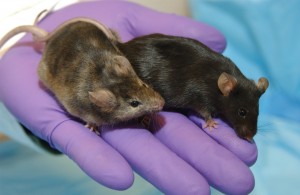**********
The NC DNA Day CONNECT blog is back! We’re excited for another year of sharing exciting science news and interesting research going on here in North Carolina and around the world. We will have a new post each Thursday, so make sure to check back every week!
**********
By Michelle Engle
The phrases “laboratory animals”, “lab rats”, and even the idea of scientific testing on lab mice tend to bring up mixed feelings when presented in the news. Organizations like PETA are strictly against animal testing, and stores like Lush refuse to use animal testing on their products as part of their all-natural campaign. But how do scientists feel about the use of lab animals?

A monument to the humble laboratory mouse; without them, scientific progress would be impossible. – Image from Wikipedia
Scientists are not the cold and calculating people sometimes portrayed by the media – rather, scientists are trained to understand the risks and rewards of testing on animals instead of on people. College students who have taken biology and other life science classes say they feel “generally concerned about the welfare of animals used in research”, but that they also “appreciated and valued the need for animal experimentation”. This attitude of careful and compassionate use of animals in the laboratory carries on as those students become scientists.
Scientists also recognize that experiments on animals carry both ethical and scientific concerns. To address the ethical issues, each research institution has strict animal care and use requirements. These requirements minimize the number of animals used, reduce the amount of discomfort they feel, and regulate living conditions. These requirements were developed by scientists who understood that it’s important to treat research animals humanely.

The relationship between laboratory mice and scientists is complex – there are many ethical and scientific issues at play. – Image from Wikipedia
The main goal of biomedical research is to help people by preventing or treating disease. Research animals are fundamentally different from humans, so any discoveries made in research animals must be confirmed in the human population. Many drugs found to be effective in mice have no effect on people! However, testing drugs first on mice helps speed up the drug discovery process by eliminating ineffective drugs, thereby preventing many human deaths.
Scientists are constantly re-evaluating their use of animals to make sure that the use of the animals is justified. For example, the NIH announced in 2015 that they would eliminate the use of chimpanzees in research – a study of chimpanzee research found that the same scientific experiments could be done more humanely in apes or non-primate animals and that chimpanzees were not adding new scientific information. As science evolves, fewer experiments on animals are needed – many questions can be answered through computer simulations or by using human cell lines instead. The scientific progress made in the past century meant that chimpanzees were no longer needed to answer questions about human disease, and the NIH responded by retiring all laboratory chimpanzees and banning further experiments on chimpanzees.

The NIH announced that it would no longer allow testing on chimpanzees in 2015 after a study showed that they were no longer needed for scientific progress. – Image from Wikipedia
When the subject of laboratory animals and research comes up, understand that it’s not a black and white issue. Scientists are not blindly killing animals and subjecting them to horrible procedures. Animal rights activists are often not aware of the efforts by scientists to address the ethical concerns. Scientists are proactively working to reduce and improve animal testing constantly. As with the chimpanzees, scientists hope to eliminate animal testing as more scientific knowledge and better technology evolve. Whether or not you decide to support animal research, it’s important to understand the issue from both the scientists’ and the animal rights activists’ viewpoints.
Edited by Christina Marvin and Kelsey Gray
